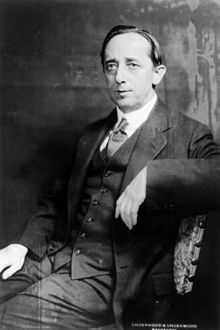Claude Bowers

Claude Gernade Bowers (November 20, 1878 in Westfield, Indiana – January 21, 1958 in New York City) was an American writer, Democratic politician, and ambassador to Spain and Chile.
Biography
Bowers began his career as a journalist with a newspaper in Terre Haute, Indiana and, while residing there, became the Democratic candidate for the U.S. House of Representatives at the request of powerful Democratic leader John Edward Lamb. Though he lost, the experience polished his abundant speaking skills. Bowers' enormously popular books Party Battles of the Jackson Period (1922) and Jefferson and Hamilton: The Struggle for Democracy in America (1925) were political manifestos that denounced the Federalist Party, the Whig Party, and the Republican Party as bastions of aristocracy, and hailed the Democrats as true heroes. He was an editorial writer for the New York World from 1923 to 1931, and a political columnist for the New York Journal from 1931 to 1933.
In his very popular histories Bowers promoted the idea that Thomas Jefferson had founded the Democratic Party. President Franklin D. Roosevelt, an avid reader of Bowers, built the Jefferson Memorial. Bowers' The Tragic Era (1929) attracted wide attention for its attack on the Republican Party, which Bowers believed humiliated the South and corrupted the North during Reconstruction. His research was based on the Dunning School. He was the temporary chairman of the 1928 Democratic National Convention where he gave a keynote speech (text in New York Times June 27, 1928. p. 8). Roosevelt appointed him ambassador to Spain and later Chile.
Although disillusioned when the New Deal veered away from pristine low-budget Jeffersonian principles, Bowers held his tongue and never criticized his patron. His biography of Senator Albert J. Beveridge, Beveridge and the Progressive Era (1932) was non-polemical and of high quality. He continued writing late into his life, completing My Mission to Spain in 1954, which chronicled his time in Spain as ambassador, covering both his travels throughout the country, and the hectic politics that foreshadowed the Spanish Civil War. Bowers was highly critical of what he saw as fascist agitation and strongly defended the regime of the Spanish Second Republic.
He died of leukemia in 1958 and is buried at Highland Lawn Cemetery in Terre Haute, Indiana.
References
Books by Bowers
- The Irish Orators: A History of Ireland's Fight for Freedom (PDF) (1916)
- The Life of John Worth Kern (PDF) (1918)
- The Party Battles of the Jackson Period (1922)
- Jefferson and Hamilton: The Struggle for Democracy in America (1925)
- The Tragic Era: The Revolution after Lincoln (1929).
- Beveridge and the Progressive Era (1932)
- Jefferson in Power: The Death Struggle of the Federalists (1936)
- The Spanish Adventures of Washington Irving (1940)
- The Young Jefferson, 1743-1789 (1945)
- Pierre Vergniaud: Voice of the French Revolution (1950)
- My Mission to Spain: Watching the Rehearsal for World War II (1954) Simon and Schuster New York at Internet Archives
- Chile through embassy windows, 1939-1953 (1958)
- My Life: The Memoirs of Claude Bowers (1962).
- Indianapolis in the 'Gay Nineties': High School Diaries of Claude G. Bowers edited by Holman Hamilton and Gayle Thornbrough, (1964)
Scholarly studies
- Merrill D. Peterson. The Jefferson Image in the American Mind (1998). partly online
- Peter J. Sehlinger and Holman Hamilton. Spokesman for Democracy: Claude G. Bowers, 1878-1958 (2000).
- Spencer, Thomas T. "'Old' Democrats and New Deal Politics: Claude G. Bowers, James A. Farley, and the Changing Democratic Party, 1933-1940" Indiana Magazine of History 1996 92(1): 26-45. ISSN 0019-6673
- Taylor, F. Jay. The United States and the Spanish Civil War, 1936-1939. 1956, 1971, Introduction by Bowers.
External links
| Diplomatic posts | ||
|---|---|---|
| Preceded by Irwin B. Laughlin |
U.S. Ambassador to Spain 1933–1939 |
Succeeded by Alexander W. Weddell |
| Preceded by Norman Armour |
U.S. Ambassador to Chile 1939–1953 |
Succeeded by Willard L. Beaulac |
| |||||
|